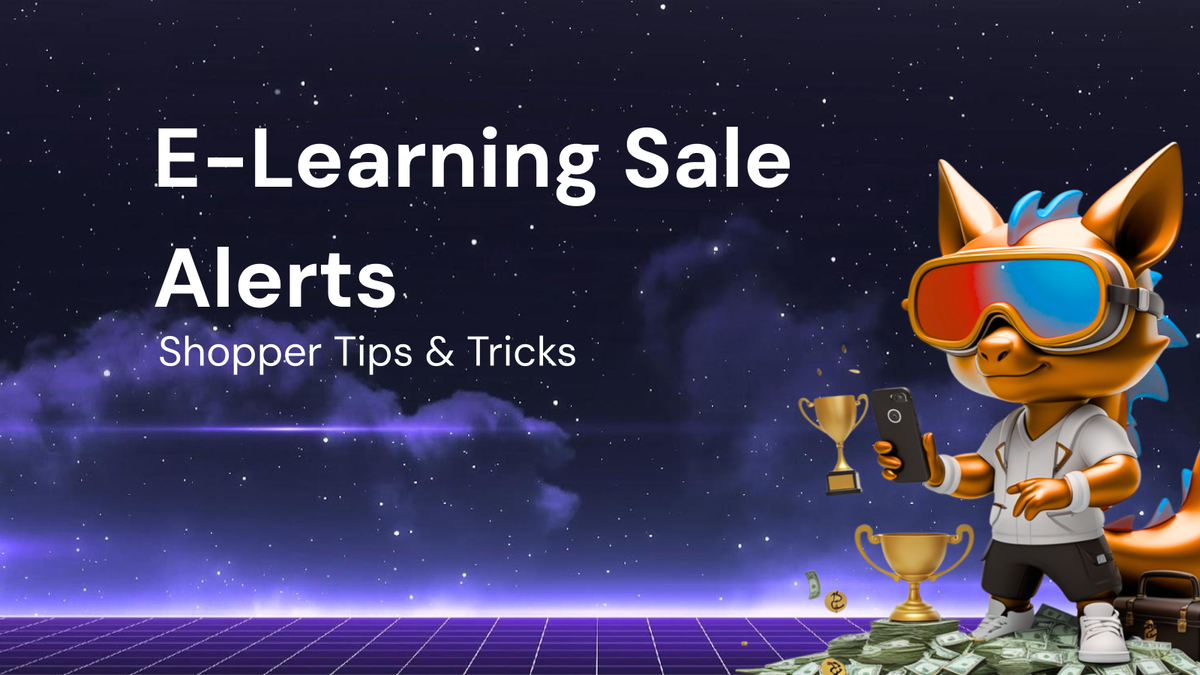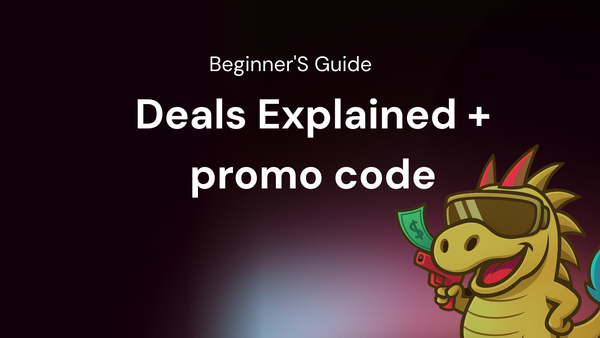Tips & Tricks Every Shopper Should Know for e-learning platforms sale alerts

Tips & Tricks Every Shopper Should Know for e-Learning Platform Sale Alerts
In today's fast-paced world, lifelong learning is no longer a luxury but a necessity. Whether you're looking to upskill for a career change, delve into a new hobby, or simply expand your knowledge base, e-learning platforms offer unparalleled accessibility and flexibility. The good news is, these platforms frequently offer sales and promotions, making quality education even more affordable. However, navigating the world of e-learning sales can be overwhelming. This article provides a comprehensive guide to help you become a savvy shopper and maximize your savings when hunting for e-learning deals.
I. Understanding the e-Learning Landscape and Sales Dynamics
Before diving into specific tips, it's crucial to understand the broader e-learning ecosystem and the factors that drive sales.
A. Types of e-Learning Platforms
E-learning platforms come in various forms, each with its unique strengths and pricing models:
- Massive Open Online Courses (MOOCs): Platforms like Coursera, edX, and Udacity offer courses from top universities and institutions worldwide. These often have free audit options and paid certificates or degree programs. Sales tend to focus on discounts for certificate programs and specializations.
- Skill-Based Learning Platforms: Platforms like Skillshare, Udemy, and LinkedIn Learning focus on practical skills, often taught by industry professionals. These typically operate on a subscription model or offer individual course purchases. Sales often involve discounted subscriptions or individual course promotions.
- Specialized Learning Platforms: Platforms dedicated to specific fields, like Codecademy for coding or MasterClass for creative arts, provide in-depth learning experiences. Their sales strategies often involve bundled course deals or membership discounts.
- Corporate Training Platforms: Platforms like Pluralsight and DataCamp cater to businesses looking to train their employees. While individual users can access these, sales are often geared towards enterprise clients.
B. Common Types of e-Learning Sales and Promotions
Understanding the different types of sales will help you identify the best deals for your needs:
- Seasonal Sales: These occur around major holidays like Black Friday, Cyber Monday, Christmas, and New Year's. These sales often feature the steepest discounts of the year.
- Back-to-School Sales: Targeted towards students and educators, these sales typically offer discounts on academic courses and software.
- Anniversary Sales: Platforms often celebrate their anniversaries with special promotions, offering discounts on subscriptions or individual courses.
- Limited-Time Offers: Flash sales, daily deals, or weekly promotions create a sense of urgency and encourage quick purchases.
- New Course Launch Promotions: Platforms often offer introductory discounts on new courses to generate initial interest.
- Bundled Course Deals: Purchasing multiple courses together can often result in significant savings compared to buying them individually.
- Subscription Discounts: Many platforms offer discounted subscription rates for longer-term commitments (e.g., annual subscriptions).
- Free Trials: Take advantage of free trials to explore a platform's content and features before committing to a paid subscription or course.
- Scholarships and Financial Aid: Some platforms offer scholarships or financial aid programs to students who demonstrate financial need.
C. Factors Influencing Sale Frequency and Discount Amounts
Several factors influence how often and how deeply e-learning platforms discount their offerings:
- Competition: The highly competitive e-learning market drives platforms to offer frequent sales to attract and retain customers.
- Seasonality: Demand for e-learning courses tends to fluctuate throughout the year, with peaks during the back-to-school season and periods of lower activity during holidays.
- Marketing Budget: Platforms allocate a portion of their marketing budget to promotional activities, influencing the frequency and scale of sales.
- Course Popularity: Less popular courses are often discounted more heavily to incentivize enrollment.
- Platform Growth Goals: Platforms focused on rapid growth may offer more aggressive discounts to acquire new users.
II. Proactive Strategies for Finding and Tracking Sales
Instead of passively waiting for sales to appear, take a proactive approach to finding and tracking e-learning deals:
A. Subscribe to Platform Newsletters and Email Lists
This is arguably the most straightforward method. Sign up for the newsletters of the platforms you're interested in. They will regularly send you emails announcing upcoming sales, exclusive deals, and new course launches.
- Tip: Create a dedicated email folder or use email filters to organize these newsletters, preventing them from cluttering your main inbox.
B. Follow Platforms on Social Media
Most e-learning platforms have active social media presence on platforms like Facebook, Twitter, LinkedIn, and Instagram. Following them will allow you to stay updated on their latest promotions, announcements, and even exclusive social media-only deals.
- Tip: Set up notifications for specific platforms so you don't miss out on time-sensitive offers.
C. Utilize Deal Websites and Coupon Aggregators
Several websites specialize in aggregating deals and coupons from various online retailers, including e-learning platforms. Some popular options include:
- RetailMeNot: Offers a wide range of coupon codes and deals for various online merchants.
- Honey: A browser extension that automatically finds and applies coupon codes while you shop online.
- Slickdeals: A community-driven website where users share and vote on the best deals available online.
- Groupon: Features local and national deals, including discounts on online courses and subscriptions.
- Tip: Be cautious of fake or expired coupon codes. Always verify the validity of a coupon before attempting to use it.
D. Set Up Google Alerts for Specific Keywords
Google Alerts allows you to monitor the web for new content matching your specified keywords. Set up alerts for terms like "[Platform Name] sale," "[Course Name] discount," or "e-learning deals" to receive notifications whenever relevant content is published.
- Tip: Refine your search terms to be as specific as possible to minimize irrelevant results.
E. Join Online Learning Communities and Forums
Online communities and forums dedicated to e-learning can be valuable sources of information about sales, discounts, and promotions. Members often share deals they've found and provide insights into upcoming sales events.
- Examples: Reddit's r/eLearning and r/onlinelearning, as well as dedicated forums on platforms like Coursera and Udemy.
F. Use Browser Extensions for Price Tracking
Some browser extensions allow you to track the price history of online courses and receive notifications when the price drops.
- Examples: Keepa (for Amazon) can be adapted to track course prices if the course is sold on Amazon. While less common, some platforms do sell courses through Amazon.
- Tip: Research the extension's privacy policy before installing it to ensure your data is protected.
III. Evaluating E-Learning Platform Sale Alerts: Making Informed Decisions
Finding a sale is only the first step. It's crucial to carefully evaluate the offer before making a purchase to ensure it aligns with your learning goals and provides real value.
A. Assess Your Learning Needs and Goals
Before browsing sales, take some time to reflect on your learning objectives. What skills do you want to acquire? What topics are you interested in? What career goals are you pursuing?
- Tip: Create a list of specific courses or skills you want to learn. This will help you narrow your focus and avoid impulse purchases.
B. Research Course Content and Instructor Credentials
Don't be swayed by a low price alone. Carefully examine the course syllabus, learning outcomes, and instructor credentials.
- Look for:
- A clear and well-structured curriculum.
- Specific and measurable learning objectives.
- Instructors with relevant experience and expertise.
- Positive student reviews and ratings.
- Sample lectures or course previews.
- Be wary of:
- Vague course descriptions.
- Overly ambitious claims.
- Instructors with limited credentials.
- Negative or nonexistent student reviews.
C. Consider the Platform's Reputation and Support
Choose platforms with a solid reputation for quality content, reliable technology, and responsive customer support.
- Check:
- Online reviews and ratings.
- The platform's refund policy.
- The availability of technical support.
- The platform's community forums or discussion boards.
D. Compare Prices Across Different Platforms
Don't assume that the first sale you see is the best deal available. Compare prices across multiple platforms to ensure you're getting the most value for your money.
- Tip: Use price comparison websites or browser extensions to automate this process.
E. Read the Fine Print: Terms and Conditions
Carefully review the terms and conditions of the sale before making a purchase. Pay attention to:
- Expiration Dates: Ensure the sale is still valid.
- Redemption Codes: Understand how to redeem any discount codes.
- Course Access Duration: Determine how long you'll have access to the course materials.
- Refund Policies: Understand the platform's refund policy in case you're not satisfied with the course.
- Renewal Terms (for subscriptions): Be aware of the auto-renewal terms and how to cancel your subscription if desired.
F. Beware of Upselling and Bundling Tactics
Some platforms may use upselling or bundling tactics to encourage you to spend more money. Be mindful of these strategies and only purchase courses or subscriptions that you genuinely need.
- Upselling: Attempting to sell you a more expensive or premium version of the product you initially intended to buy.
- Bundling: Offering multiple courses or services together as a package deal.
G. Take Advantage of Free Trials and Course Previews
Before committing to a paid course or subscription, take advantage of any free trials or course previews offered by the platform. This will allow you to assess the quality of the content and the teaching style before making a purchase.
- Tip: Schedule time to actively engage with the free trial to get a realistic sense of the course experience.
IV. Advanced Strategies for Maximizing Savings
Beyond the basic tips, here are some advanced strategies for savvy e-learning shoppers:
A. Leverage Student Discounts and Educational Programs
Many e-learning platforms offer discounts to students enrolled in accredited educational institutions. Check if you're eligible for a student discount and take advantage of it.
- Tip: You may need to provide proof of enrollment, such as a student ID or transcript.
B. Explore Employer-Sponsored Learning Opportunities
Many employers offer tuition reimbursement programs or subscriptions to e-learning platforms as part of their employee benefits packages. Check with your HR department to see if you're eligible for these programs.
- Tip: If your employer doesn't offer such benefits, consider suggesting it to them. Emphasize the benefits of employee upskilling and professional development.
C. Consider Lifetime Access Options
Some platforms offer lifetime access to courses for a one-time fee. While this may be more expensive upfront, it can be a cost-effective option if you plan to revisit the course materials multiple times over the long term.
- Considerations: Think about the likelihood of the platform remaining active for the duration you anticipate needing the course. Also, consider if the course content will become outdated.
D. Negotiate Prices or Request Discounts
Don't be afraid to negotiate prices or request discounts, especially if you're purchasing multiple courses or subscribing for a long-term period.
- Tactics:
- Contact the platform's customer support and politely inquire about potential discounts.
- Mention that you're considering competing platforms and ask if they can match or beat their prices.
- If you're purchasing courses for a group or organization, inquire about bulk discounts.
E. Combine Multiple Discounts and Promotions
Some platforms allow you to combine multiple discounts and promotions, such as a student discount with a seasonal sale. Take advantage of these opportunities to maximize your savings.
- Tip: Read the terms and conditions carefully to ensure that multiple discounts can be combined.
F. Track Your Spending and Budget Accordingly
Keep track of your spending on e-learning courses and subscriptions to ensure you're staying within your budget.
- Tools: Use budgeting apps or spreadsheets to monitor your expenses and identify areas where you can save money.
G. Share Deals with Friends and Family
If you find a great deal on an e-learning course or subscription, share it with your friends and family. They may be interested in taking advantage of the offer as well.
- Win-Win: Some platforms offer referral bonuses for each new user you bring to the platform.
V. Staying Updated and Adapting to the Evolving Landscape
The e-learning landscape is constantly evolving, with new platforms, courses, and sales strategies emerging regularly. Staying updated and adapting to these changes is crucial for maximizing your savings and making informed decisions.
A. Continuously Monitor Your Favorite Platforms and Resources
Regularly check the websites, social media accounts, and newsletters of your favorite e-learning platforms to stay informed about their latest promotions and offerings.
B. Read Industry News and Blogs
Follow industry news websites and blogs to stay updated on the latest trends and developments in the e-learning market.
C. Network with Other Learners
Connect with other learners in online communities and forums to share tips, insights, and experiences related to e-learning sales and promotions.
D. Be Open to Experimenting with New Platforms and Courses
Don't be afraid to try out new platforms and courses, even if you're already familiar with a few established options. You may discover hidden gems that offer unique learning experiences at competitive prices.
E. Regularly Review and Update Your Learning Goals
As your skills and interests evolve, regularly review and update your learning goals to ensure they align with your career aspirations and personal development objectives. This will help you focus your learning efforts and avoid wasting money on courses that are no longer relevant to your needs.
VI. Conclusion: Becoming a Savvy e-Learning Shopper
Navigating the world of e-learning platform sale alerts can be a rewarding experience, allowing you to access quality education at affordable prices. By understanding the e-learning landscape, proactively tracking sales, carefully evaluating offers, and employing advanced savings strategies, you can become a savvy shopper and maximize your learning potential. Remember to continuously adapt to the evolving market and prioritize your learning goals to make informed decisions that align with your aspirations. Happy learning!




